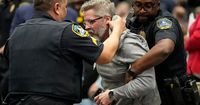In a chaotic town hall meeting on April 15, 2025, U.S. Representative Marjorie Taylor Greene faced fierce protests from several attendees, resulting in the arrest of three individuals and the use of stun guns on two of them by police. The event took place at the Acworth Community Center in Georgia, just outside of Atlanta, and quickly descended into turmoil as Greene began her remarks.
As Greene opened the meeting, she welcomed the approximately 150 attendees, emphasizing that the gathering was not a political rally or a protest. "This is a peaceful town hall," she stated, urging any dissenters to remain silent or leave. However, within minutes, protesters started interrupting her, leading to the intervention of law enforcement.
According to police reports, at least six individuals were escorted out of the venue for disruptive behavior. Among those removed was Andrew Russell Nelms, who began booing Greene almost immediately. Officers deployed a stun gun on him twice as they attempted to escort him from the premises. Greene, seemingly unfazed by the chaos, continued her speech, thanking the police for their efforts and expressing her disapproval of the protesters' actions.
Greene's remarks included a staunch defense of former President Donald Trump and a critique of the media, which she accused of defending an illegal alien linked to MS-13. She referred to Kilmar Abrego Garcia, a Maryland resident who was erroneously deported to El Salvador, and characterized the media's coverage of his case as shameful. "That is shameful and that should never happen," Greene asserted.
As the event progressed, the atmosphere remained tense. Greene dismissed hostile questions from the audience, labeling those who posed them as "brainwashed" by their news consumption. She reiterated her commitment to supporting Trump's agenda, stating, "What am I going to do? I am going to stand by my president," which was met with cheers from her supporters.
Despite the support from many attendees, the protests outside the venue were significant, with several hundred demonstrators lining the streets, holding signs that read "Pro America, Anti Trump" and "Resist!" This stark contrast highlighted the divided opinions surrounding Greene's policies and the Trump administration.
Following the event, Greene told reporters that the protesters had been "out of line" and that there was a designated area for them outside the venue to express their First Amendment rights. She also expressed satisfaction with the police response, stating, "I’m glad they got thrown out. That’s exactly what I wanted to see happen." Greene's comments came amidst a broader trend of escalating tensions at GOP town halls, prompting some party leaders to advise their members against holding such events altogether.
In the aftermath of the town hall, Essence Johnson, chair of the Cobb County Democratic Party, criticized the arrests, claiming that the protesters had been "unjustly arrested" and that their frustrations were rooted in a feeling of disenfranchisement and anger toward the current political climate. "People are passionate now. They’re upset. They’re frustrated. They believe democracy is being taken away from them. They’re at their wits end," Johnson remarked.
The event also underscored a growing divide within the Republican Party regarding how to engage with constituents. Greene's defiance in the face of protests contrasts sharply with the caution exercised by other GOP members, who have opted for virtual town halls to avoid potential confrontations. Speaker of the House Mike Johnson has urged Republican lawmakers to reconsider in-person gatherings due to the heightened risk of volatile interactions.
As Greene continues to garner attention for her outspoken support of Trump and her controversial positions, she has hinted at a potential run for U.S. Senate or the governorship of Georgia in 2026. However, the path ahead appears fraught with challenges, particularly as voter dissatisfaction grows.
In conclusion, the events at Greene's town hall reflect a microcosm of the current political landscape in the United States, where divisions are deepening, and the dialogue between elected officials and constituents is becoming increasingly fraught with tension.









